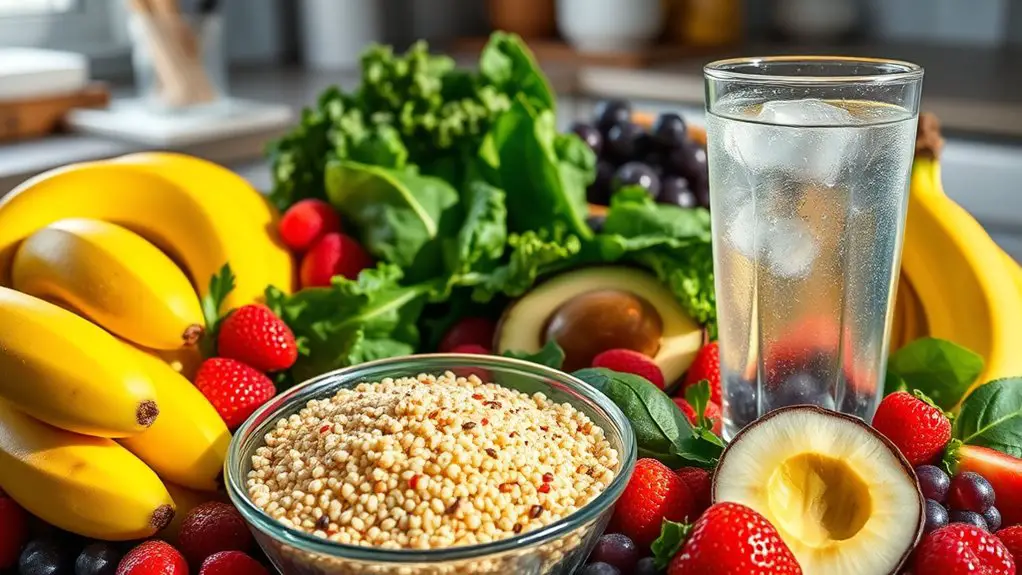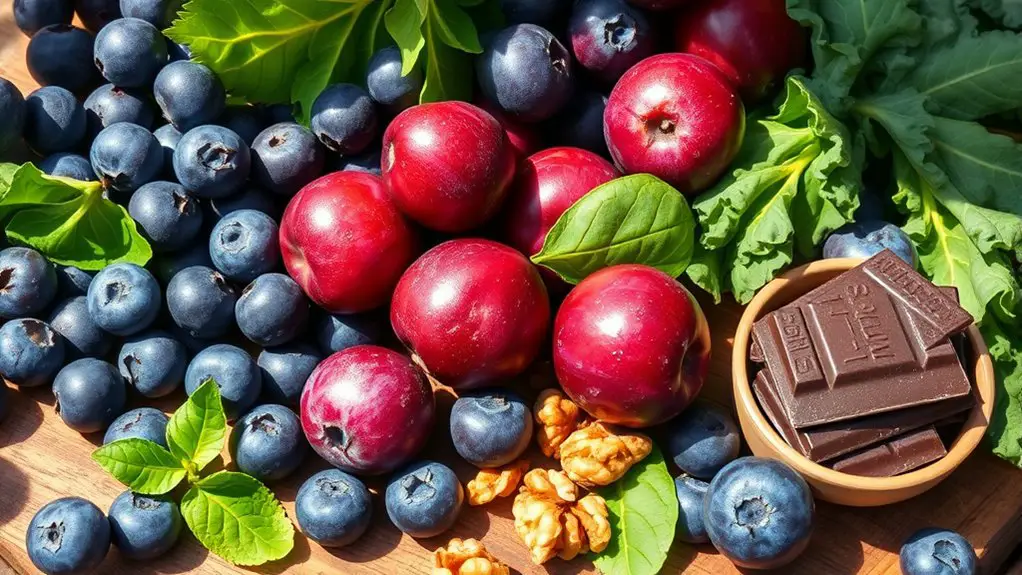To properly carb-load before a big event, start 3-4 days in advance, increasing your carbohydrate intake to 6-10 grams per kilogram of body weight daily. Focus on complex carbs like whole grains, fruits, and vegetables for sustained energy. Don't forget to balance your meals with protein and healthy fats for muscle recovery. Staying hydrated is essential too. Finally, test your plan during training to find the right balance for your body and performance. There's more to explore about effective strategies!
Understanding Glycogen and Its Role in Performance
Understanding glycogen and its role in performance is essential, especially when you're gearing up for a big event. Glycogen is your body's primary source of energy during prolonged, intense activities. When you push your limits, your muscles tap into glycogen stores to fuel your movements. The more glycogen you have, the longer you can maintain your performance, giving you the freedom to excel.
Imagine running that extra mile or powering through the final minutes of a game—having ample glycogen can make all the difference. It's stored in your muscles and liver, ready to be converted into glucose when you need it most. Proper glycogen management ensures that you can sustain your efforts without hitting the wall.
To maximize your glycogen stores, focus on a balanced diet rich in carbohydrates in the days leading up to your event. This preparation not only enhances your performance but also empowers you to embrace the challenge ahead with confidence and energy. So, fuel up and get ready to release your potential!
When to Start Carb-Loading
To maximize your glycogen stores effectively, you should start carb-loading about three to four days before your big event. This timeframe allows your body to absorb and store those carbs efficiently, giving you the energy boost you need. Starting too early might lead to excess weight gain, while waiting too long could leave you feeling depleted.
During this period, focus on gradually increasing your carbohydrate intake without drastically changing your diet. This approach helps your body adapt and utilize the extra carbs effectively. Keep your meals balanced, incorporating whole grains, fruits, and vegetables, while maintaining hydration.
As you near the event, pay attention to how your body responds. Everyone's different, and finding your sweet spot is key to feeling energized and ready to perform. Trust the process and enjoy the freedom that comes with being well-fueled and prepared for your big day!
How Much Carbohydrate to Consume
As you ramp up your carbohydrate intake, figuring out how much to consume is key. A general guideline is to aim for about 6-10 grams of carbohydrates per kilogram of your body weight per day in the days leading up to your event. This range gives you the flexibility to tailor your intake based on your activity level and personal needs. If you're training intensely, lean towards the higher end; if your training is less demanding, you can dial it back a bit.
Listening to your body is essential—pay attention to how you feel as you increase your carbs. You don't want to overdo it and end up feeling sluggish. Instead, find that sweet spot where you feel energized and ready to take on your big event. Remember, this isn't just about numbers; it's about fueling your freedom to perform at your best!
Choosing the Right Carbohydrates
When it comes to carb-loading, not all carbohydrates are created equal. You'll want to focus on the right mix of simple and complex carbs, as well as the benefits of whole grains. Plus, timing your intake can make a big difference in how effectively your body uses those carbs.
Simple vs. Complex Carbs
Understanding the difference between simple and complex carbs is essential for effective carb-loading before a big event. Simple carbs, like sugary snacks and white bread, provide quick energy but can lead to crashes. They're great for immediate fuel but not for sustained performance. On the other hand, complex carbs, found in foods like oats and whole grain pasta, digest more slowly, offering long-lasting energy that keeps you fueled throughout your event. When you're planning your carb-loading meals, aim for a balance. You'll want to include both types—simple carbs for that immediate boost and complex carbs for the endurance you need. By making informed choices, you're empowering yourself to perform at your best and enjoy the freedom that comes with it.
Whole Grains Benefits
Whole grains are a powerhouse in the world of carbohydrates, offering a wealth of benefits for your body and performance. They're packed with fiber, which helps regulate digestion and keeps you feeling full longer—perfect for fueling those long training sessions. Whole grains also provide essential nutrients like B vitamins, iron, and magnesium, which support energy production and muscle function. When you choose whole grains, you're opting for a slower release of energy, preventing those dreaded energy crashes. Plus, their rich antioxidant content can help reduce inflammation, enhancing recovery. So, whether you're hitting the trails or the gym, incorporating whole grains into your diet can boost your stamina and help you perform your best. Embrace the freedom of whole grains!
Timing Your Intake
To maximize your performance on race day, it's crucial to pay attention to when you consume carbohydrates. Ideally, you should start increasing your carb intake about three days before the event. Focus on high-quality sources like whole grains, fruits, and starchy vegetables. This isn't just about quantity; it's about timing. The day before the race, aim for a carb-rich meal to fuel your muscles. On race day, eat a light breakfast rich in carbs—think oatmeal or a bagel—about two to three hours before you start. This gives your body time to digest and convert those carbs into energy. Remember, the right timing can make all the difference in your performance, so plan ahead and enjoy the freedom that comes with being well-fueled.
Balancing Carbs With Other Nutrients
While loading up on carbs is essential, you can't overlook the importance of balancing them with other nutrients. Protein plays a vital role in your recovery, helping to repair muscles after intense activity. Plus, incorporating healthy fats can provide sustained energy to keep you going strong. Prioritizing muscle recovery allows for greater performance in future workouts.
Protein's Role in Recovery
Recovery after intense physical activity hinges on a delicate balance of nutrients, with protein playing a crucial role. When you push your limits, your muscles need repair, and protein helps rebuild and strengthen them. It's not just about carbs; incorporating protein into your post-workout meals guarantees you'll recover faster and feel ready for your next challenge. Aim for lean sources like chicken, fish, or legumes, and don't forget to pair them with your favorite carbs for ideal recovery. This synergy fuels your body, allowing you to break free from fatigue and get back to what you love. So, next time you refuel, remember to include that essential protein and set yourself up for success!
Healthy Fats for Energy
After addressing the importance of protein in your post-workout routine, it's vital to contemplate the role of healthy fats in your overall nutrition strategy. Healthy fats, like avocados, nuts, and olive oil, provide a concentrated source of energy. When you're carb-loading, don't forget to balance those carbs with fats for sustained energy. Fats slow digestion, helping you feel fuller longer and keeping your energy levels steady during intense training or competitions. Plus, they're significant for absorbing fat-soluble vitamins. So, embrace a variety of healthy fats in your meals. It's about freedom in your choices—fuel your body in a way that feels good and supports your performance. Enjoy the taste and benefits of healthy fats as part of your prep!
Hydration: An Essential Component
Although carb-loading is essential for your performance, hydration plays an equally important role in ensuring your body can effectively utilize those carbohydrates. Staying properly hydrated helps maintain your energy levels, supports muscle function, and aids in recovery.
Here's a quick breakdown of hydration's benefits:
| Benefit | Importance | Tips |
|---|---|---|
| Energy Maintenance | Keeps energy stable | Drink water regularly |
| Muscle Function | Prevents cramps | Include electrolyte drinks |
| Recovery | Speeds up healing | Hydrate post-exercise |
| Performance | Enhances endurance | Drink before, during, after |
When you're preparing for a big event, don't just focus on carbs; make hydration a priority too. Proper hydration helps avoid dehydration, and by giving your body what it needs, you'll embrace the freedom to perform at your best.
Testing Your Carb-Loading Strategy
Before you plunge into carb-loading for your big event, it's vital to test your strategy to guarantee it works for you. Start by choosing a smaller event, like a local race or training session, to experiment with your carb intake. Pay attention to how your body responds, noting any changes in energy levels, digestion, and overall performance.
It's important to vary the types of carbs you consume—try whole grains, fruits, and even some pasta. This way, you can discover what fuels you best without feeling heavy or sluggish. Also, test your hydration strategy alongside your carb-loading.
Don't hesitate to tweak your approach based on these trials. Freedom in your performance comes from knowing what works for you. Ultimately, this testing phase gives you the confidence and insight to optimize your carb-loading for the main event, ensuring you hit the ground running when it truly matters.
Common Mistakes to Avoid
Testing your carb-loading strategy is a great way to build your confidence, but it's just as important to be aware of common mistakes that can derail your efforts. Here are some pitfalls to avoid:
| Mistake | Consequence | Solution |
|---|---|---|
| Overloading too early | Digestive discomfort | Gradually increase intake |
| Ignoring hydration | Decreased performance | Drink plenty of water |
| Skipping fiber | Gastrointestinal issues | Include moderate fiber |
| Not timing meals correctly | Low energy levels | Stick to a structured plan |
| Choosing the wrong carbs | Inefficient energy release | Opt for complex carbs |
Sample Carb-Loading Meal Plan
When planning your carb-loading meals, it's crucial to focus on balance and variety to guarantee your body has the fuel it needs. Start your day with a hearty bowl of oatmeal topped with banana slices and a drizzle of honey. For lunch, enjoy a quinoa salad with mixed veggies, chickpeas, and a light vinaigrette. As an afternoon snack, grab a handful of whole-grain crackers with hummus. Dinner can be a delightful whole-grain pasta dish with marinara sauce, grilled chicken, and a side of steamed broccoli. Don't forget to hydrate! Sip on water or coconut water throughout the day. Finally, treat yourself to a sweet potato or a fruit smoothie as an evening snack. This meal plan not only satisfies your cravings but also keeps your energy levels high, setting you up for success in your big event. Balancing macronutrients enhances your performance by ensuring your body has the necessary nutrients to excel. Enjoy the freedom of choice while fueling your body!
Frequently Asked Questions
Can I Carb-Load Before Any Type of Physical Event?
You can definitely carb-load before various physical events. It's about fueling your body for peak performance. Just remember to choose the right types of carbs, timing, and listen to how your body feels. Enjoy the freedom!
Are There Specific Foods to Avoid While Carb-Loading?
When carb-loading, you'll want to avoid heavy fats, high-fiber foods, and sugary snacks. They can upset your stomach or cause energy crashes, so stick to simple carbs for the best results during your event.
How Does Carb-Loading Affect My Weight?
You can't have your cake and eat it too, right? Carb-loading can temporarily increase your weight due to water retention, but it fuels your performance. Balance is key, so enjoy it without guilt!
Should I Adjust My Training During the Carb-Loading Phase?
Yes, you should adjust your training during the carb-loading phase. Focus on lighter workouts to conserve energy, allowing your body to store those carbs effectively without overexerting yourself before the big event.
Is It Necessary to Consult a Nutritionist for Carb-Loading?
Think of your body as a high-performance engine. While consulting a nutritionist isn't strictly necessary, their expertise can fine-tune your fueling strategy, helping you maximize energy and achieve your goals with greater freedom and confidence.




